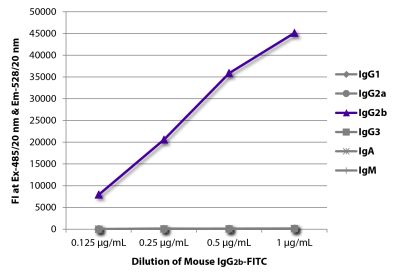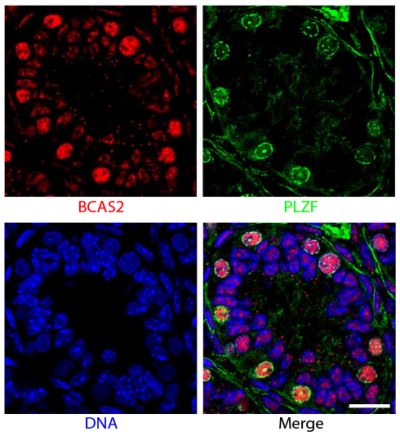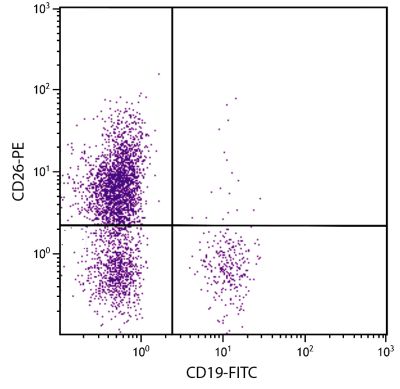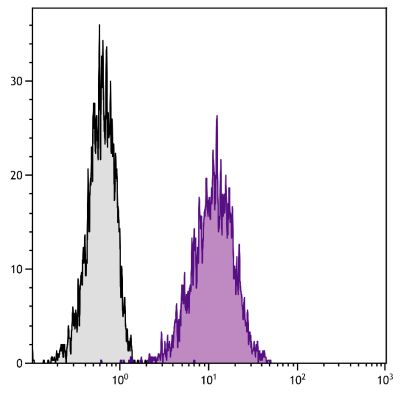Mouse Anti-Human CD49f-FITC (4F10)
Cat. No.:
9650-02
FITC Anti-Human CD49f antibody for use in flow cytometry and immunohistochemistry assays.
$359.00
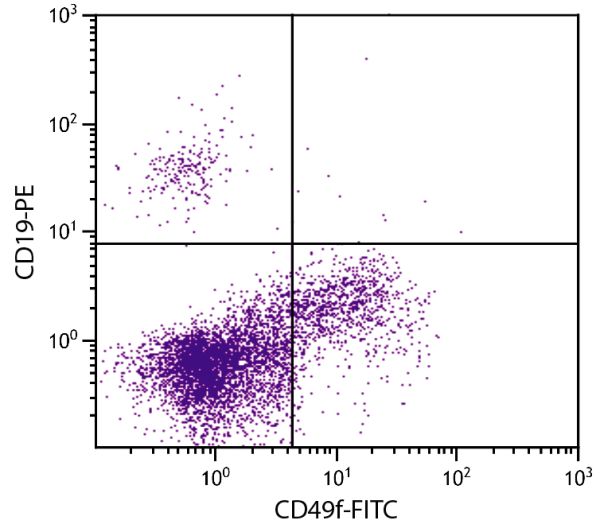

| Clone | 4F10 |
|---|---|
| Isotype | Mouse (BALB/c) IgG2bκ |
| Isotype Control | Mouse IgG2b-FITC (A-1) |
| Specificity | Human CD49f |
| Alternative Names | Integrin α6 chain, VLA-6 α chain, platelet gpIc |
| Description | CD49f is the 125 kDa integrin α6 chain which associates noncovalently with the integrin β1 subunit (CD29) and with the integrin β4 (CD104) chain to form, respectively, the very late antigen-6 (VLA-6) and α6β4 integrin heterodimers. VLA-6 is expressed on thymocytes, T lymphocytes, monocytes, and platelets. CD49f/CD29 expression is upregulated on activated T lymphocytes and memory T cells. VLA-6 serves as the laminin receptor on platelets, monocytes, and T cells. VLA-6-mediated binding to laminin provides a costimulatory signal to T cells for activation and proliferation. |
| Immunogen | SW1222 human colorectal cell line |
| Conjugate | FITC (Fluorescein) |
| Buffer Formulation | Phosphate buffered saline containing < 0.1% sodium azide |
| Clonality | Monoclonal |
| Concentration | Lot specific |
| Volume | 1.0 mL |
| Recommended Storage | 2-8°C; Avoid exposure to light |
| Applications |
Flow Cytometry – Quality tested 4 Immunohistochemistry-Frozen Sections – Reported in literature 1 Immunohistochemistry-Paraffin Sections – Reported in literature 2 Immunoprecipitation – Reported in literature 3 |
| RRID Number | AB_2797041 |
| Gene ID |
3655 (Human) |
| Gene ID Symbol |
ITGA6 (Human) |
| Gene ID Aliases | CD49f; ITGA6B; VLA-6 |
| UniProt ID |
P23229 (Human |
| UniProt Name |
ITA6_HUMAN (Human) |
Documentation
Certificate of Analysis Lookup
Enter the Catalog Number and Lot Number for the Certificate of Analysis you wish to view
- 1. Bonnekoh B, Pommer AJ, Böckelmann R, Philipsen L, Hofmeister H, Gollnick H. In-situ-topoproteome analysis of cutaneous lymphomas: perspectives of assistance for dermatohistologic diagnostics by Multi Epitope Ligand Cartography (MELC). J Dtsch Dermatol Ges. 2008;6:1038-51. (IHC-FS)
- 2. Pontes-Júnior J, Reis ST, de Oliveira LC, Sant'Anna AC, Dall'Oglio MF, Antunes AA, et al. Association between integrin expression and prognosis in localized prostate cancer. Prostate. 2010;70:1189-95. (IHC-PS)
- 3. Serru V, Le Naour F, Billard M, Azorsa DO, Lanza F, Boucheix C, et al. Selective tetraspan-integrin complexes (CD81/α4β1, CD151/α3β1, CD151/α6β1) under conditions disrupting tetraspan interactions. Biochem J. 1999;340:103-11. (IP)
- 4. Roy V, Verfaillie CM. Expression and function of cell adhesion molecules on fetal liver, cord blood and bone marrow hematopoietic progenitors: implications for anatomical localization and developmental stage specific regulation of hematopoiesis. Exp Hematol. 1999;27:302-12. (FC)
See All References


